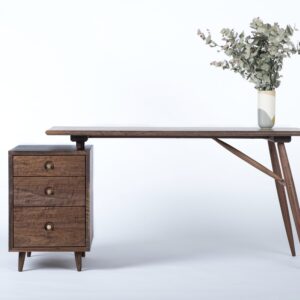Handcrafted Natural Wood Office Furniture
With more and more people working from home–and no reason to return to the office–why not complete your home office with a durable, attractive, and downright functional natural wood office desk from Beauty and Bread Woodshop? Each desk is crafted by hand (with the help of a few power tools) and lovingly constructed.
-
Muir Writing Desk
John Muir is remembered today because of his prolific writing about naturalism and conservation at the end of the 19th and early 20th centuries. We can, in large part, thank him for the existence of National Parks. His rapturous writings captured the minds and hearts of a generation, reminding them that mankind does indeed need beauty in as much as it needs bread to survive, that natural places were significant as well as vulnerable. With his writings, he advocated for natural beauty to be inherently valued, not merely as a resource, but by nature of its very existence.
Please use this desk to leave your own mark on history, hopefully, one with as much or even more fervor than its namesake.
$5,250.00Muir Writing Desk
$5,250.00
